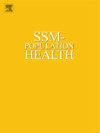The impact of digital infrastructure construction on older adults' cognitive health: Evidence from a quasi-natural experiment in China
IF 3.6
2区 医学
Q1 PUBLIC, ENVIRONMENTAL & OCCUPATIONAL HEALTH
引用次数: 0
Abstract
The digital infrastructure has profoundly changed people's daily lives and health outcomes. However, the causal effect of digital infrastructure on cognitive health remains unclear. The study employs the “Broadband China” policy as a reliable proxy for digital infrastructure, using the China Health and Retirement Longitudinal Study (CHARLS) five waves panel data from 2011 to 2020 and a staggered difference-in-differences (DID) method to investigate the causal impact of digital infrastructure construction on the cognitive health in Chinese older adults. We find that digital infrastructure construction has a significant positive effect on the cognitive health of older adults, and the dynamic DID results confirm a persistent effect. Mechanism analysis shows that digital infrastructure improves cognitive health by increasing social interaction, health promotion behaviors (including medical insurance participation and physical exercise), and reducing medical costs. Heterogeneity analysis indicates that the cognitive health-improving effect of digital infrastructure construction is stronger among older adults living in urban areas and high-GDP cities, male, low and middle-aged, and highly educated. Our research findings provide empirical evidence for improving cognitive health and healthy aging among older adults through the development of digital infrastructure.
数字基础设施建设对老年人认知健康的影响:来自中国准自然实验的证据
数字基础设施深刻改变了人们的日常生活和健康状况。然而,数字基础设施对认知健康的因果影响尚不清楚。本研究采用“宽带中国”政策作为数字基础设施的可靠代理,使用中国健康与退休纵向研究(CHARLS) 2011 - 2020年的五波面板数据和交错差中差(DID)方法研究数字基础设施建设对中国老年人认知健康的因果影响。研究发现,数字基础设施建设对老年人认知健康有显著的正向影响,且动态DID结果证实了这种影响的持续性。机制分析表明,数字基础设施通过增加社会互动、健康促进行为(包括参加医疗保险和体育锻炼)和降低医疗成本来改善认知健康。异质性分析表明,数字基础设施建设的认知健康改善作用在城市和高gdp城市的老年人、男性、中低龄和高学历人群中更强。研究结果为通过数字基础设施的发展改善老年人的认知健康和健康老龄化提供了实证证据。
本文章由计算机程序翻译,如有差异,请以英文原文为准。
求助全文
约1分钟内获得全文
求助全文
来源期刊

Ssm-Population Health
PUBLIC, ENVIRONMENTAL & OCCUPATIONAL HEALTH-
CiteScore
6.50
自引率
2.10%
发文量
298
审稿时长
101 days
期刊介绍:
SSM - Population Health. The new online only, open access, peer reviewed journal in all areas relating Social Science research to population health. SSM - Population Health shares the same Editors-in Chief and general approach to manuscripts as its sister journal, Social Science & Medicine. The journal takes a broad approach to the field especially welcoming interdisciplinary papers from across the Social Sciences and allied areas. SSM - Population Health offers an alternative outlet for work which might not be considered, or is classed as ''out of scope'' elsewhere, and prioritizes fast peer review and publication to the benefit of authors and readers. The journal welcomes all types of paper from traditional primary research articles, replication studies, short communications, methodological studies, instrument validation, opinion pieces, literature reviews, etc. SSM - Population Health also offers the opportunity to publish special issues or sections to reflect current interest and research in topical or developing areas. The journal fully supports authors wanting to present their research in an innovative fashion though the use of multimedia formats.
 求助内容:
求助内容: 应助结果提醒方式:
应助结果提醒方式:


